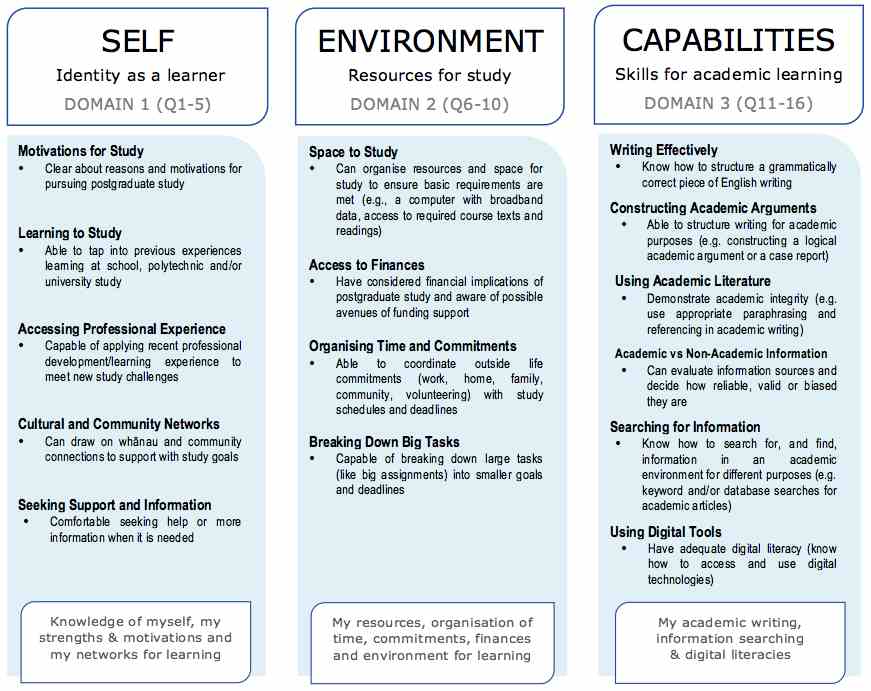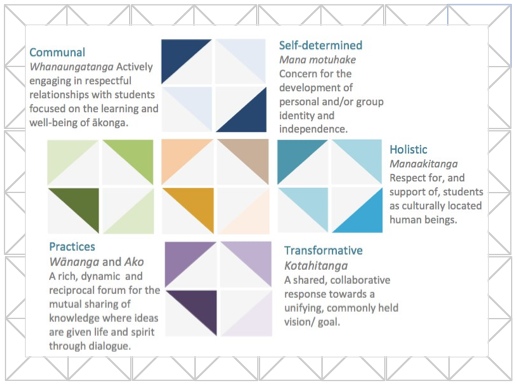Guiding Principles and Framework
The framework that follows has been developed by Māori and Pacific staff and students. It has guided the development of the all of the linked PG Poutama STEPPS tools on this site.
PG Poutama STEPPS Guiding Framework
Experienced staff and students say the following three domains - self, environment and capabilities - are essential steps to build upon in preparing for postgraduate study. We encourage new Māori and Pacific postgraduate students to look at areas where you have strengths and use these to help you to build on areas where you feel less prepared. A key message from previous students to you as new students is to look for support from whānau, friends and work colleagues as you prepare for your study journey ahead.
Three 'Domains' of Preparation for Postgraduate Study

PG Poutama STEPPS Guiding Principles The following statements describe the five guiding principles that have informed the creation of these online PG Poutama STEPPS tools. These statements also summarise beliefs we hold about you as an individual, as a learner, and about our role in fostering your learning experience through your postgrad study journey.
|
1. Transformative Learning is transformative in nature. Study is a journey that begins prior to day one of the semester and is based on a relationship that needs to be built up between a student and the learning institution’s representatives. The learning journey often involves navigating multiple complex relationships, communities, expectations, systems, practices, policies, tools, technologies - many of which may be entirely new or previously unfamiliar. It ideally also involves the students’ workplace and whānau.
|
2. Holistic Learning is holistic and as such, involves and draws from personal emotional, experiential and spiritual aspects often before, and while, cognitive and “academic” domains can be and are engaged. Drawing from a strengths-based approach acknowledges the wairua and knowledge of each individual - who students are and the experience they bring to the learning situation and to learning relationships. It encourages staff to think more deeply about the impact of emotions, attitudes and affective aspects (self-belief, confidence, motivation) on feeling ‘normal’, normalised, and a part of academic learning communities within postgraduate study settings.
|
3. Self-determined Students are self-determined and should be able to define their learning journey with the backing of whanau, friends, mentors, and a supportive academic community.
|
4. Communal Learning is often communal and part of social communities; ideally it involves reciprocal relationships and knowledge sharing, particularly in the situation of many Māoriand Pacific students. Uses of online technology should consider how to mediate any constraints of online resources being accessed or developed solely for “individuals”.
|
5. Set of Practices Carrying out study can be about engaging in a new set of practices, cultural assumptions and rituals; however, in joining a new (academic) community, students need to be able to maintain, and strengthen, their existing identities in relation to their cultural, community and social links. It is the work of both the academic community to make explicit what are often ‘tacit’ assumptions and expectations; and it is the work of students to learn how to take advantage of support mechanisms available to them as they add new skills and understandings to their existing identity and professional practices. |




